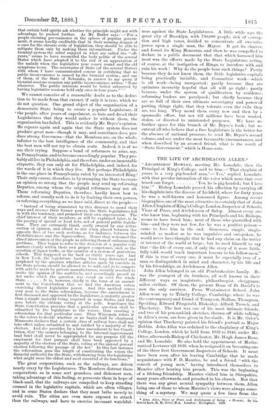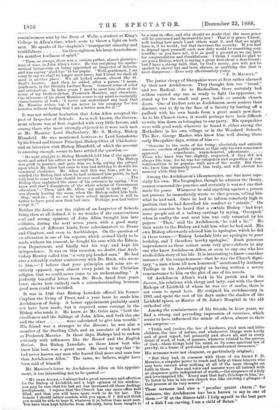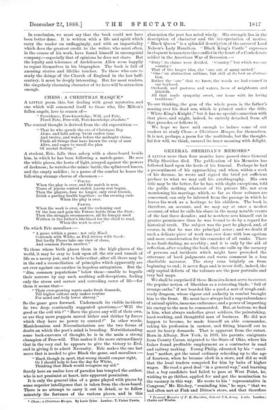THE LIFE OF ARCHDEACON ALLEN.*
"ARCHBISHOP HOWLEY, meeting Mr. Lonsdale, then the Principal of King's College, said to him,—' That chaplain of yours is a very pig-headed man,'—' Yes,' replied Lonsdale, with that pecular intonation of the voice which none that ever heard can forget Yes, he is pig-headed; but I love him." Bishop Lonsdale proved his affection by carrying off his chaplain into the diocese of Lichfield, where for forty years he was a well-known and honoured figure. Among recent biographies, one of the most attractive is certainly that of John Allen, Chaplain of King's College, London, Inspector of Schools, Vicar of Prees, and Archdeacon of Salop. Almost every one who knew him, beginning with his Principals and his Bishops, seems to have loved him ; most of those who quarrelled with him—and they were not few, for he was a positive person— came to love him in the end. Generous, simple, single- minded, as modest as he was impulsive and outspoken, he would never have thought that he had any claim on the notice or interest of the world at large ; but he used himself to say
that the life of every one, if only the story of it were faith- fully told, would teach important lessons to his fellow-men." If this is true of every one, it must be especially true of a man so distinguished in mind and character, by his life and by his friendships, as Archdeacon Allen.
John Allen belonged to an old Pembrokeshire family. He was the youngest of six brothers, all well known in their different ways as magistrate, philanthropist, clergyman, sailor, civilian. Of them, the present Dean of St. David's is now the only survivor. From Westminster School, John Allen went up to Trinity College, Cambridge, where he was the contemporary and friend of Tennyson, Hallam, Thompson. Spedding, Edward Fitzgerald, Blakesley, Alford, Trench, and Thackeray. The last was one of his most intimate friends, and two of his pen-and-ink sketches, thrown off while talking in Allen's room, are here given in fac-simile. It is Mr. Grier's opinion that Thackeray painted his friend's portrait as Major Dobbin. John Allen was ordained to the chaplaincy of King's College, London, which he held from 1833 to 1846, under Mr. Otter, afterwards Bishop of Chichester, Mr. Hugh James Rose, and Mr. Lonsdale. He also held the appointment of Mathe- matical Lecturer till 1839, when he resigned it on becoming one of the three first Government Inspectors of Schools. It must have been soon after his leaving Cambridge that he made acquaintance with F. D. Maurice, he and a friend, "with the conceit of young men," having introduced themselves to Maurice after hearing him preach. This was the beginning of a lifelong friendship. Maurice visited him in Shropshire, many years afterwards, and preached in his church. Not that there was any great mental sympathy between them, Allen being one of those to whom Maurice's views were always some- thing of a mystery. 'We may quote a few lines from the • John Allen, Vicar of Press and Archdeacon of Salop : a Drayton. By hie Son-in-Law, R. M. Grier, M.A. London : Bivingtons. 1589.
reminiscences sent by the Dean of Wells, a student at King's College in Allen's time, which seem to throw a light on both men. He speaks of the chaplain's "transparent sincerity and truthfulness his thoroughness, his large-heartedness, his manifest lowliness of spirit."
"Then, as always, there was a certain pathos, almost plaintive- ness of tone, in John Allen's voice. He was resigning his mathe- matical lectureship on being appointed as Inspector of Schools, and was saying 'good-bye' to his pupils. 'Well, gentlemen, I am sorry to say we shall no longer meet here ; but I trust we shall all meet in another place.' We all looked solemn, almost like St. Paul's hearers. And then he added, after a pause, I mean, gentlemen, in the Divinity Lecture Room.' General sense of relief and satisfaction. In later years I used to meet him often at the house of my brother-in-law, Frederick Maurice, and elsewhere. One utterance of his about Maurice comes to my mind as eminently characteristic of both : I never can understand any book that Mr. Maurice writes, but I am never in his company for ten minutes without feeling that I am a better man for it.' " It was not without hesitation that John Allen accepted the post of Inspector of Schools. As is well known, the Govern-
ment scheme was at first regarded with very little favour, and among those who most strongly objected to it were such men as Mr. Maurice, Lord Shaftesbury, Mr. S. Morley, Bishop Blomfield. He was mentioned, however, to Lord Lansdowne by his friend and former Principal, Bishop Otter. of Chichester, and an interview with Bishop Blomfield, of which the account is amusing enough, seems to have settled the question :—
"He went straight to Bishop Blomfield, told him of the appoint-
ment, and asked his advice as to accepting it The Bishop was gruff in manner, and gave him no help, saying the subject upon which Mr. Allen had come to him had nothing to do with his canonical obedience. Mr. Allen said this was true ; yet he re- minded the Bishop that when he had ordained him priest, he had
told him to come to him should he ever need advice The Bishop then explained the cause of his reticence by saying, You know well that I disapprove of the whole scheme of Government education.'—' Then,' said Mr. Allen, my mind is made up.' He was already leaving the room, when the Bishop called him back. 'Stay,' said he ; if we are to have school inspectors, it will be better to have good men than bad ones. Perhaps you had better accept it.'"
Neither the duties nor the rights of an Inspector of Schools being then at all defined, it is no wonder if the conscientious zeal and strong opinions of John Allen brought him into
collision, during the next seven years, with a good many authorities of different kinds, from schoolmasters to Deans and Chapters, and even to Archbishops. On the question of an alteration in one of his reports, which seemed likely to be made without his consent, he fought his case with the Educa- tion Department, and finally had his way, and kept his independence. It was on this occasion, no doubt, that Arch-
bishop Howley called him "a very pig-headed man." He had also a tolerably violent controversy with Dr. Hook, who wrote to him,—" I believe that your principles and mine are so entirely opposed, upon almost every point in the Christian religion, that we could never come to an understanding." A perfectly beautiful letter from Dr. Hook, dated four years later, shows how entirely such a misunderstanding between good men could be rectified.
It was in 1846 that Bishop Lonsdale offered his former chaplain the living of Prees, and a year later he made him Archdeacon of Salop. A better appointment probably could not have been made, but it required some courage in the Bishop who made it. He knew, as Mr. Grier says, "both the excellences and the failings of John Allen, and both the one and the other were calculated to give him trouble."
His friend was a stranger to the diocese ; he was also a member of the Sterling Club, and an associate of such men as Frederick Maurice. In those days, Bishops had to reckon seriously with influences like the Record and the English Review. But Bishop Lonsdale, as those know best who knew him best, was a great man. He used to say that "he had never known any man who feared God more and man less than Archdeacon Allen." The same, we believe, might have been said of himself.
Mr. Maurice's letter to Archdeacon Allen on his appoint- ment, is too interesting not to be quoted :—
"My DEAR ALLEN,—I always had a great reverence and affection for the Bishop of Lichfield, and a high opinion of his wisdom ; you may be sure that his last act has increased all these feelings prodigiously. I rejoice that the Church has one more office well filled, and that you will have more work to do for her. The honour I should rather condole with you upon, if I did not think you would be able to bear it, whatever it is, better than most men. You have been kept hitherto from officialty, have been taught to be a man in office, and why should we doubt that the same grace will be continued and increased to you ? That it is grace, I know, well feeling how much I and others want it, and that we might have it, if we would; but that increases the security. If you had to depend upon yourself, each new duty would be something very terrible; as you have not, it is as good a ground as we can have. for congratulation and thankfulness. I think I could be glad to see you a Bishop, which is saying a great deal about a dear friend ; but I have a strong faith that, by God's mercy, you will not be spoiled by shovel hat and lawn sleeves, or anything else that is most dangerous.—Ever very affectionately yours,
"F. D. MAURICE."
The junior clergy of Shropshire were at first rather alarmed by their new Archdeacon. They thought him too " broad " and too Radical. As to Radicalism, there certainly had seldom existed any one so ready to fight the oppressor, to stand up for the small and poor, inside or outside church doors. One of his first acts as Archdeacon, more zealous than discreet, was to fly in the face of a faculty by tearing off a padlock with his own bands from a great man's pew-door. As to his Church views, it would perhaps have been difficult to write him down as belonging to any party. His sympathies. were with good work, wherever he found it, either among the Methodists in his own village, or in the Woodard Schools. The Rev. George Master, who knew him well during those early Shropshire days, writes of him :—
"Genuine to the roots of his being ; absolutely and entirely sincere ; careless of public opinion, so that only his own conscience
approved considerate, warm-hearted, affectionate Those who knew him but slightly, respected, if they did not always like him ; for he was too outspoken and regardless of con- ventionalities to be popular with men of the world. But those who knew him intimately loved him truly, and will cherish his memory while they live."
Among the Archdeacon's idiosyncrasies, one was most espe- cially his own. His biographer, though he admires the theory, cannot commend the practice, and certainly it was not one that made for peace. Whenever he said anything against a person not present, he immediately wrote to that person, telling him what he had said. Once he had to inform somebody high in position that he had described his conduct as "satanic." On another occasion he heard that a certain Bishop "had kept some people out of a railway carriage by saying, 'Occupied, when in reality the seat next him was only tenanted by his papers. Then,' said the Archdeacon, he told a lie." He then wrote to the Bishop and told him what he had said. His own Bishop afterwards advised him to apologise, which he did in these terms,—" Bishop Lonsdale bids me apologise to your lordship, and I therefore hereby apologise." Such generous imprudences as these cannot seem very grave_defects to any one who knew Archdeacon Allen, or even to any one who has studied this story of his life. It is interesting to know—another instance of his outspokenness—that he was the Church digni- tary," a man whom all men honoured," mentioned by Anthony Trollope in his Autobiography as having written a severe remonstrance to him on the plot of one of his novels.
Of Archdeacon Allen's work in his parish and in the diocese, his relations with clergy and laity, and with the three Bishops of Lichfield of whom he was car et oculus, there is not room to speak here. He resigned his archdeaconry in 1883, and spent the rest of his days under the shadow of the Lichfield spires, as Master of St. John's Hospital in the old cathedral city.
Among the reminiscences of his friends, in later years, we
find a strong and pervading impression of reverence, which seems to have influenced the minds of others, almost to their OWR surprise :— "Truth and justice, the law of kindness, good men and little children, the face of nature, and whatsoever things were lovely and of good report, but primarily and above all, and in every detail of word, of look, of manner, whatever related to the service of God,—these things held his mind, as by some spiritual law of gravity, in a frame of profound yet unconstrained reverence."
His sermons were not eloquent, or particularly original ;
"But they had, in common with those of his friend F. D. Maurice, a singular power to touch and help at times hearers who may have carried away nothing at all of the mere thought set forth in them. Face and voice and manner were all imbued with an eloquence quite independent of words,—the eloquence of a holy and love-inspired life. 'Every man that hath this hope in him,' &c. To listen to him in his own church was like catching a glimpse cf that process at its very source."
These sermons had also a "peculiar quaint charm ;" for instance, the Archdeacon has ben known to say in one of them :—" If at the dinner-table I help myself to the best part- of a dish I am carving, I am a child of Satan."
In conclusion, we must say that the book could not have been better done. It is written with a life and spirit which carry the reader on unflaggingly, and with an impartiality which does the greatest credit to the writer, who must often, in the course of his work, have found himself in uncongenial company,—especially that of opinions he does not share. But the loyalty and tolerance of Archdeacon Allen seem happily to repeat themselves in his biographer. The book is full of amusing stories and lifelike touches. To those who care to study the doings of the Church of England in the last half- century, it must be deeply interesting. But for most readers, the singularly charming character of its hero will be attraction enough.












































 Previous page
Previous page